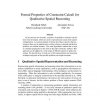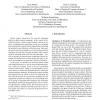2043 search results - page 72 / 409 » Reasoning About Security Models |
POPL
2007
ACM
14 years 10 months ago
2007
ACM
Separation Logic, Ambient Logic and Context Logic are based on a similar style of reasoning about structured data. They each consist of a structural (separating) composition for r...
FUIN
2010
13 years 9 months ago
2010
A formal model for diagnostics of biological systems modelled as P systems is presented. We assume the presence of some biologically motivated changes (frequently pathological) in ...
IDT
2008
13 years 10 months ago
2008
: Many defense, homeland security, and commercial security objectives require continuous tracking of mobile entities such as aircraft. The systems that perform these functions prod...
KI
2002
Springer
13 years 10 months ago
2002
Springer
In the previous two decades, a number of qualitative constraint calculi have been developed, which are used to represent and reason about spatial configurations. A common property...
SRDS
2006
IEEE
14 years 4 months ago
2006
IEEE
Failure models characterise the expected component failures in fault-tolerant computing. In the context of distributed systems, a failure model usually consists of two parts: a fu...


